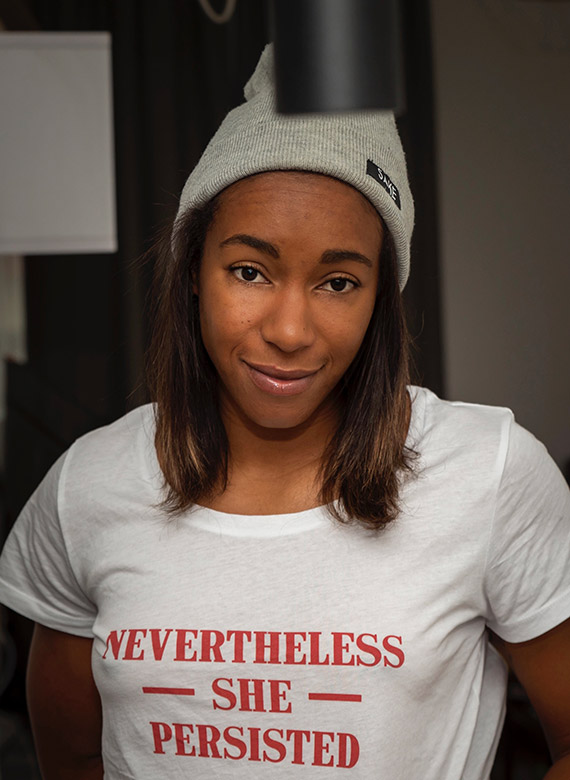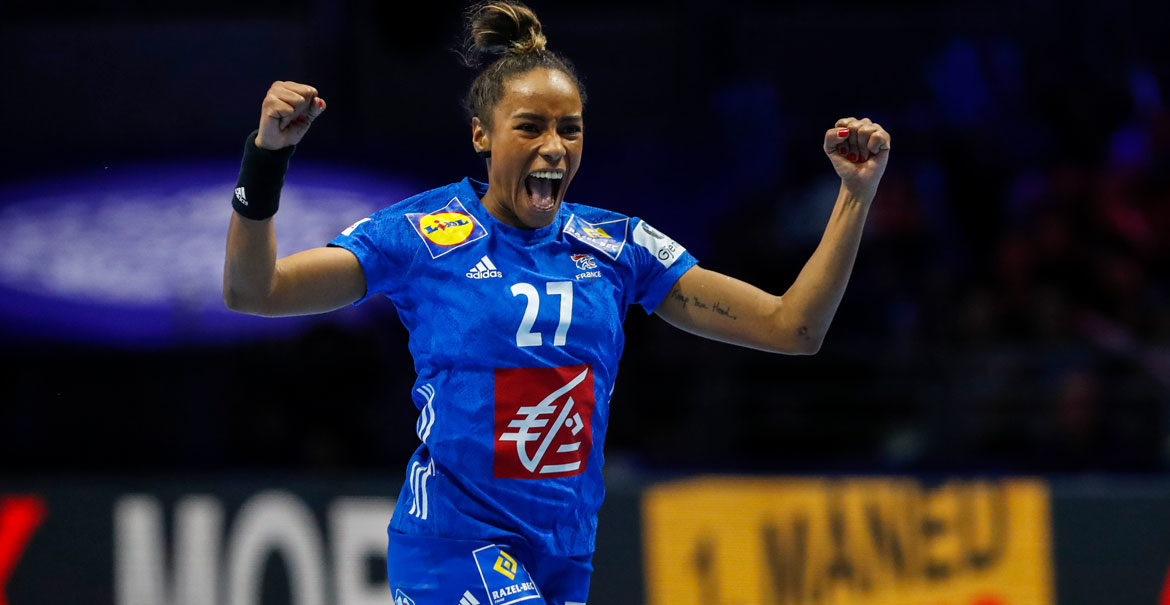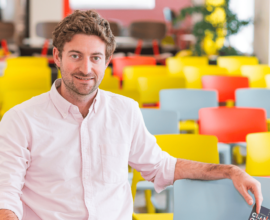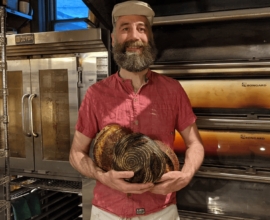Estelle Nze Minko
The gamechanger
![]() Reading Time: 9 minutes
Reading Time: 9 minutes
PROFESSIONAL HANDBALL PLAYER, ENTREPRENEUR
What first impresses when we meet Estelle Nze Minko, the centre back for the France women’s national handball team, is her extrovert, rebellious, and uncompromising nature. However, it also doesn’t take long to discover her insecure, sensitive, and compassionate side. Estelle won the World Championships in 2017, the Euros in 2018, and a silver medal at the 2016 Olympics. She plays for Györ in Hungary, the holy grail for handball players. So clearly, her vulnerabilities have not prevented her from excelling in her discipline. Yet her nuanced and complex personality clashes with the spirit of the ruthless winning machine that pro athletes are expected to embrace. Estelle has become increasingly frustrated with the stereotype of “the perfect athlete”, and she has started to use her notoriety to break a taboo or two.
One of the myths, which Estelle doesn’t buy into, is that elite athletes should be obsessed by their sport, and their sport only. So Last year, Estelle launched her startup, The V Box. “But I don’t want to be associated with those football players who invest in a fancy shisha bar, just to make a quick buck… if you see what I mean!” She stresses that for her, this venture is an adventure more than a business. A modern feminist, this entrepreneur is shattering the old marketing notion that beauty is the only topic that women care about, by designing a new generation of gift boxes.
Estelle - who graduated from Audencia SciencesCom, finds the world of media both daunting and fascinating. She tells us how the art of communicating has proven essential both to her entrepreneurial success, and to her attempt to shift the lines in the world of elite sports.
Were you brought up by sports-mad parents?
Quite the opposite! I was born in Saint-Sébastien-sur-Loire, a small town near Nantes. I am mixed-race; my mum is French, she’s a French teacher, and my father was born in Gabon, one of 17 siblings. His parents detected his strong academic potential early on and when he was 12, they sent him, alone, to stay with an aunt in France so he could get a better education. He became a service technician for Arcelor-Mittal where he worked all his life.
My parents both value a traditional academic education, and their objective was for me to earn some qualifications and get a secure job. Their concerns were representative of a generation for whom success meant landing a job for life. Plus, I was their firstborn (I have two younger siblings) so they were anxious to figure out how to give me the best possible education. They put a lot of pressure on me; but I understand them better now that I am thinking perhaps of becoming a mother myself one day.
As a child, I didn’t know what I wanted to do with my life; but I knew I wanted an atypical one. I wanted to seek inspiring and fulfilling projects rather than a successful career in the traditional sense. Academically, I performed well because my parents coached me. But my school reports were invariably marked with comments about my chitchats and my lack of focus. I was a tomboy – which drove my parents crazy, and a bit of a rebel who liked to challenge the rules.
I felt the need to exert myself and I loved sport. There were some years where I was enrolled in 5 different sports, so my parents were constantly driving me from one practice session to the next. I started handball at the age of 12 and when I was 15, I had the opportunity to join the “Pôle Espoir”, a structure for young players, combining school curriculum and sports training. My parents were uneasy about it, but once they were reassured about the academic standards, they let me go.
Tell us about your time at Audencia SciencesCom?
I passed a scientific baccalaureate because my parents thought it would open more opportunities for me, even though I had a stronger affinity for humanities. At 17, I signed my first contract as a pro. In parallel, I started studying psychomotricity, which, in hindsight I never had any interest for. After 2 years, I decided to quit, but I didn’t tell my parents until I had my back-up plan in place. I enrolled in a communication and media course and following that, got accepted at SciencesCom. This programme at Audencia has been a real eye-opener. It allowed me to absorb media differently, discover what goes on behind the scenes, and become more inquisitive.
The challenge was that I joined the national French team that same year. I had to fit in lessons, group projects, training twice a day with my club, plus the international competitions. Not forgetting some occasional partying! Fortunately, Audencia allowed me to take my master’s over two years, but they were two pretty intense years! I feel so grateful to have been accepted in a school that was in good standing as well as flexible. It is something that professional athletes often struggle to find.
How did your life change when you joined the French national team?
It was a huge step up in terms of rhythm, discipline and commitment. The performance was on another level, and I was besieged with imposter syndrome. I remember singing the French national anthem and looking at my teammates wondering what I was doing among them. The pressure is considerable when you play in a jersey with your name in big letters, in stadiums with over 10,000 spectators, when the games are televised, and you are expected to face the press. Beneath my extrovert appearance, I have always struggled to believe in myself. And yet somehow, I managed to climb that massive step. I know a lot of skilful players who have not, because they couldn’t deal with the pressure. Paradoxically, I think I got so overwhelmed that I became uninhibited, and I just went with the flow instead of trying to control everything.
Can you single out the most emotional moment of your sporting career?
The Olympic Games were obviously an extraordinary experience. But my most special competition was the Euros which we won in December 2018, in France. The Euros is where the standards are highest in my sport, so it’s the most prestigious challenge. The 2nd round was in Nantes, and it felt incredible for me to play in front of my entire family, my 1st grade teacher and everyone who had seen me grow up. The celebrations that come after a victory obviously bring so many joyful moments; but for me, the biggest thrill is when you are on the court during the final, you have pushed your body to the limit after months of gruelling preparation, there’s only one minute left on the clock and you know you have won.
It feels good to recall those moments because I am currently going through a phase where my performances are lower, and it is scary, because you never know when you will bounce back. Pro-athletes tend to take each disappointing game as the end of the world. We rarely take a step back to appreciate how far we have come.

Why have you decided to become more vocal and try to shatter the image of “the perfect athlete”?
For a while, like many others, I was naive and was buying into the idea that an athlete must function like an infallible and heartless machine in order to reach the top and stay there. As I got more immersed in the world of elite sport, became more mature, and gained a better understanding of the media circus, I became increasingly frustrated, and decided to put in my own two cents worth. It’s important for me to use my public profile to talk about things that matter, especially as my popularity will be short-lived. For example, I got more and more annoyed that the impact of menstruation on female athletes was still a taboo subject. I wrote a post about it on Instagram, and was shocked by the number of positive reactions it triggered, from other female athletes, coaches, and physios, etc.
I am tired of the implicit rule that social media should only be used to make people dream. I find much more meaning in sharing messages about period poverty than in posting pictures of me pouting on a boat!
When people watch me on the court, they don’t particularly detect any vulnerability. So, they think that presenting myself publicly comes naturally to me. But I have had to brace myself! I am now gradually finding the confidence to talk about issues that I care deeply about. And I’m realising just how liberating it feels to get it out of my system, to remain authentic and true to myself.
What motivated you to launch your own start-up?
For the past five years I have been living in Györ – a medium- size town in Hungary, 90 minutes from Budapest – with little cultural or intellectual stimulation. Last year, I felt the need to take up other activities outside sport. I wanted to feel alive and to prove to myself that I was able to carry out projects and promote values beyond the world of sport.
Entrepreneurship felt like an obvious path to take. I was fortunate to have some financial stability thanks to my sporting career, so I didn’t have the pressure to turn it into a rapid financial success. I had a business concept that didn’t require a huge investment. It was mainly based on my ability to create meaningful partnerships and build a good communication strategy. The sporting competitions were on hold for several months in spring 2020 because of the Covid-19 pandemic, and I was stuck in Hungary. I took it as a blessing and decided to use that time to focus on my project.
How did you go about building The V Box brand to reflect who you are?
I have always loved surprises, and that’s why when I was 18, I subscribed to a box subscription club. But I have realised that in France, the female box market was quite limited, and based on a dated concept, always revolving around beauty. I wanted to revisit this concept and shatter the stupid cliché that all what women care about is how they look. Instead, The V box offers products designed for women by women, produced in France and with strong ethical values. Each box revolves around a certain theme: travel, sexuality, nature, etc. The V Box is based on collaborations with extraordinary women with whom I share values, and I am proud to be defending female entrepreneurship. Those girls are much more experienced, brave and talented than me, and I have benefited from our rich exchanges. It’s important for me to share their stories as much as communicating on their products.
Is entrepreneurship a way for you to prepare the post- handball years?
At the beginning, I didn’t know how to go public with this new venture, and I was worried that people would misjudge me. I assumed that I would be criticised for getting distracted from my sporting career and for jeopardising my performances. It’s fairly rare for pro-athletes at the height of their career to get seriously involved in a business activity. I also want to avoid the perception that I am just another well-paid athlete, who wants to earn some easy extra cash by capitalising on their sports fame. Several communications experts have recommended that I use my public profile as an athlete to promote my business; but I am still trying to figure out a way to communicate using my dual profile in a way that feels comfortable.
All in all, today I am in a much better place. I have realised that my club is fairly relaxed with what I do off the court, and my coach in the French team has been supportive. I am lucky to be coached by someone with a human touch, who knows me well and understands my needs. We both share the view that in sports – as in any other sector – personal fulfilment makes all the difference.
It does look like I am preparing a career change because I am learning so many new skills, and I am building a brand-new network. However, this project isn’t a calculated move for me to line up a job for myself once my sporting career is over. I see this venture as an experience rather than a business. I honestly have no idea where I will be in 10 or even 5 years’ time. This is actually what is so exciting about entrepreneurship! There is so much uncertainty, and things move so fast that it’s almost impossible to make long term plans.

How has entrepreneurship changed you?
It has been like an accelerated management course! It has taught me to remain humble and not to believe the hype that all great concepts generate millions of followers overnight. I put a lot of pressure on myself when I started, but now I am dealing with it with more patience and serenity. I believe in my business, I am more organised; what I am learning every day is starting to pay off, and I try to appreciate each little victory.
What do your loved ones think of your life choices?
My parents are sleeping soundly – at last! Even if my career is atypical, they can see that I have achieved some stability and that I am fulfilled. They are proud of what I have achieved. So many of my friends ask me: “why on earth do you intentionally make more work for yourself when you could just enjoy your sports and relax?!” But my boyfriend, who definitely has a slasher career, thinks differently and supports me.


